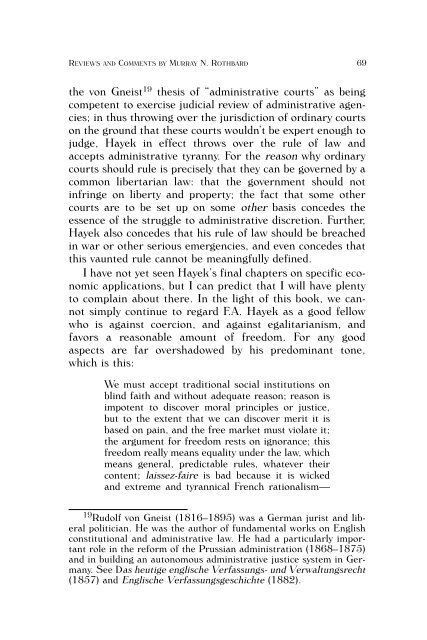Murray N. Rothbard vs. the Philosophers - Ludwig von Mises Institute
Murray N. Rothbard vs. the Philosophers - Ludwig von Mises Institute
Murray N. Rothbard vs. the Philosophers - Ludwig von Mises Institute
You also want an ePaper? Increase the reach of your titles
YUMPU automatically turns print PDFs into web optimized ePapers that Google loves.
REVIEWS AND COMMENTS BY MURRAY N. ROTHBARD 69<br />
<strong>the</strong> <strong>von</strong> Gneist 19 <strong>the</strong>sis of “administrative courts” as being<br />
competent to exercise judicial review of administrative agencies;<br />
in thus throwing over <strong>the</strong> jurisdiction of ordinary courts<br />
on <strong>the</strong> ground that <strong>the</strong>se courts wouldn’t be expert enough to<br />
judge, Hayek in effect throws over <strong>the</strong> rule of law and<br />
accepts administrative tyranny. For <strong>the</strong> reason why ordinary<br />
courts should rule is precisely that <strong>the</strong>y can be governed by a<br />
common libertarian law: that <strong>the</strong> government should not<br />
infringe on liberty and property; <strong>the</strong> fact that some o<strong>the</strong>r<br />
courts are to be set up on some o<strong>the</strong>r basis concedes <strong>the</strong><br />
essence of <strong>the</strong> struggle to administrative discretion. Fur<strong>the</strong>r,<br />
Hayek also concedes that his rule of law should be breached<br />
in war or o<strong>the</strong>r serious emergencies, and even concedes that<br />
this vaunted rule cannot be meaningfully defined.<br />
I have not yet seen Hayek’s final chapters on specific economic<br />
applications, but I can predict that I will have plenty<br />
to complain about <strong>the</strong>re. In <strong>the</strong> light of this book, we cannot<br />
simply continue to regard F.A. Hayek as a good fellow<br />
who is against coercion, and against egalitarianism, and<br />
favors a reasonable amount of freedom. For any good<br />
aspects are far overshadowed by his predominant tone,<br />
which is this:<br />
We must accept traditional social institutions on<br />
blind faith and without adequate reason; reason is<br />
impotent to discover moral principles or justice,<br />
but to <strong>the</strong> extent that we can discover merit it is<br />
based on pain, and <strong>the</strong> free market must violate it;<br />
<strong>the</strong> argument for freedom rests on ignorance; this<br />
freedom really means equality under <strong>the</strong> law, which<br />
means general, predictable rules, whatever <strong>the</strong>ir<br />
content; laissez-faire is bad because it is wicked<br />
and extreme and tyrannical French rationalism—<br />
19 Rudolf <strong>von</strong> Gneist (1816–1895) was a German jurist and liberal<br />
politician. He was <strong>the</strong> author of fundamental works on English<br />
constitutional and administrative law. He had a particularly important<br />
role in <strong>the</strong> reform of <strong>the</strong> Prussian administration (1868–1875)<br />
and in building an autonomous administrative justice system in Germany.<br />
See Das heutige englische Verfassungs- und Verwaltungsrecht<br />
(1857) and Englische Verfassungsgeschichte (1882).


